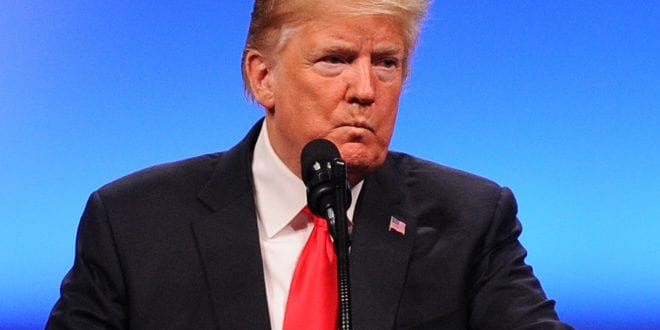The seemingly tacit trading conflict between China and the United has finally reached the boiling point after President Trump has signed an executive order which denies foreign telecoms access to the US market.
Trump’s decision was labeled “unreasonable” and ultimately “harmful to the interests of US companies and consumers.”
The War to End all Wars?
What was considered by many a cold trading war between the United States and China has now turned into an overt conflict right after President Trump signed an executive order, barring foreign telecom companies from acquiring and using US technology.
In a recently released statement, the POTUS declared that this measure was taken in order to protect America from “foreign adversaries” who are “exploiting vulnerabilities in information and communication technology infrastructure and service.”
The inflammatory decision is bound to lead to even more tensions between the US and the People’s Republic of China, even more so after the tariff hikes on China-made goods and services.
On Friday, the United States nearly doubled the price of $200 billion worth of Chinese goods. In response, China employed a similar countermeasure.
Though tensions are high, Xi Jinping, Trump’s Chinese counterpart, looks forward to resuming the talk next month during the G20 summit hosted by Japan.
What does this order contain?
According to White House sources, the executive order empowers the Secretary of Commerce to effectively block transactions that may pose a threat to a nation’s security.
Furthermore, the same sources speak of including China in the so-called “entity list,” which prohibits any market player from acquiring or using American telecom tech with prior approval from the Government.
This order appears to have been backed up by President Trump’s personal crusade of persuading allied countries to shun everything related to Chinese technology.
Following the Federal Communications Commission’s restrictions on Chinese tech, New Zealand and Australia have joined the fight, blackballing opting out next-generation 5G networks in favor of slower, but ‘more secure’ methods of data transmission.
Many speculate that President Trump’s executive order was aimed towards Chinese telecom giant Huawei, which only last year has revealed its plans to deploy 5G networks on US soil.
Ajit Pai, the acting chairman of the Federal Communications Commission, commend President Trump’s decision, arguing that it’s the first step to securing homeland communication networks.
In response to Trump’s decision, a Huawei spokesperson ruled the exec order as “unreasonable,” adding that this spur of the moment resolution may prove to be detrimental to America and to consumers. Some legal implications may arise, but the spokesperson refused to elaborate.
Trump cabinet denied that the executive order was signed to single out China’s telecom champion. However, all the signs point to what some might call a personal vendetta, possibly intended to loosen China’s grip on the global telecom market.
Although Trump’s decision will effectively keep Huawei and other major telecom players from ‘tampering’ with comm networks, it might prove to be futile in the long run since 40 to 60 percent of global are under Huawei control.
What are the implications of Trump decisions?
From a consumer’s standpoint, we can look forward to a spike in prices wherever Chinese telecom tech is involved. As for the bigger picture, according to chairman Liang Hua’s Tuesday statement, the United States has bailed out on the opportunity of deploying faster networks.
Moreover, as the rest of the world has already taken the first steps to 5G networks, the United States would have to rely on slower, in-house communications technology until a proprietary 5G-like tech can be deployed.
During the said statement, chairman Hua has reiterated the fact that China’s emerging comm tech market should not in any way be construed as an attempt to spy on foreign superpowers.
To that end, Huawei has expressed its willingness to sign a so-called no-spy agreement with all foreign governments prior to the 5G tech deployment.
Wrap-up
The informed decision or just another Trumpism?
To some, the elected official’s decision may seem like the conclusion of a vendetta that took a different course.
Will this affect the United States in any way? Most certainly.
In fact, given the fact that the executive order grants the FCC power to prohibit any kind of foreign intervention on national security grounds, we should look forward to bigger prices, suboptimal data transmission, and, perhaps, even more, tensions between China and the United States.
What is your take on Trump signing this executive order?
Do you believe that this would upscale the conflict between the two superpowers?
As always, don’t be a stranger and let us know your thoughts.
 Cyber Security Magazine
Cyber Security Magazine






